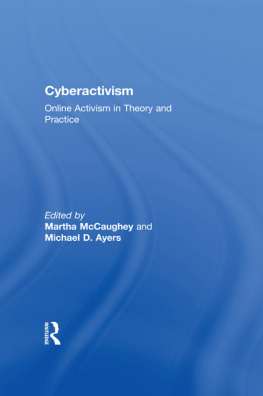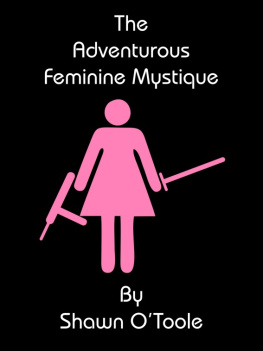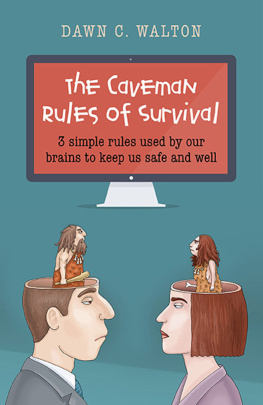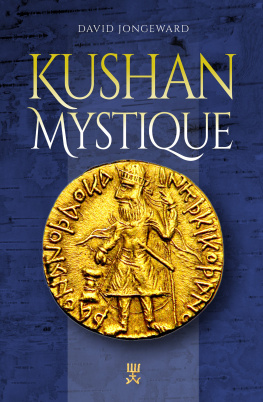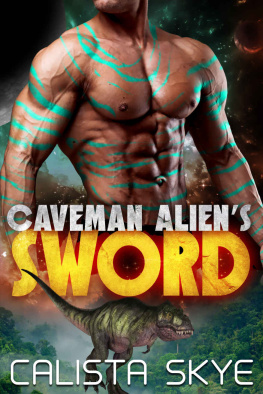THE CAVEMAN MYSTIQUE
THE CAVEMAN MYSTIQUE
Pop-Darwinism and the Debates Over Sex, Violence, and Science
MARTHA McCAUGHEY
Routledge
Taylor & Francis Group
270 Madison Avenue
New York, NY 10016
Routledge
Taylor & Francis Group
2 Park Square
Milton Park, Abingdon
Oxon OX14 4RN
2008 by Taylor & Francis Group, LLC
Routledge is an imprint of Taylor & Francis Group, an Informa business
Transferred to Digital Printing 2009
International Standard Book Number-13: 978-0-415-93475-6 (Softcover) 978-0-415-93474-9 (Hardcover)
No part of this book may be reprinted, reproduced, transmitted, or utilized in any form by any electronic, mechanical, or other means, now known or hereafter invented, including photocopying, microfilming, and recording, or in any information storage or retrieval system, without written permission from the publishers.
Trademark Notice: Product or corporate names may be trademarks or registered trademarks, and are used only for identification and explanation without intent to infringe.
Library of Congress Cataloging-in-Publication Data
McCaughey, Martha, 1966-
The Caveman mystique : pop-Darwinism and the debates over sex, violence, and science / by Martha McCaughey.
p. cm.
ISBN 978-0-415-93475-6 (pbk.) -- ISBN 978-0-415-93474-9 (cloth)
1. Sex role. 2. Men--Psychology. 3. Masculinity. 4. Sex. 5. Homosexuality. 6. Violence. 7. Evolution (Biology) I. Title.
HQ1075.M4 2007
306.7--dc22
2007010352
Visit the Taylor & Francis Web site at
http://www.taylorandfrancis.com
and the Routledge Web site at
http://www.routledge.com
CONTENTS
ACKNOWLEDGMENTS
Many people helped me in many ways over the years during which my thinking, and this book, have taken shape. Years before I knew Id write this book, I enjoyed both encouragement and superlative instruction in evolutionary theory from Professors Richard Alexander, Donald Brown, David Buss, Barbara Smuts, and Donald Symons at Michigan and UC Santa Barbara.
Once I decided to write this book, the following colleagues, friends, and family members shared readings, offered ideas, and read chapters, sustaining me through the many stages of the project: Eric Ackerman, Mike Ayers, Mary Blaisdell, Megan Boler, Todd Cherry, Adam Dreyfus, Christina French, Wyatt Galusky, Kim Hall, Bernice Hausman, Mike Hudson, Jeremy Hunsinger, Brent Jesiek, Mike Kidner, Katie King, Neal King, Piyush Mathur, Barbara McCaughey, Richard McCaughey, Adam Monroe, Jammie Price, Marc Pyko, Colin Ramsey, Mark Russell, Chuck Smith, Daniel Umlauf, Amber Vellenga, and Christine Watkins. Thanks also go to P. S. Polanah, whose enthusiastic support for all my projects should have been acknowledged sooner. Thanks especially go to Richard Widick, who for many years and across many miles has made himself available to educate and encourage me; without knowing it, he has served as my academic and personal lifeline. In addition, the graduate students in science and technology studies at Virginia Tech were not only intellectually stimulating, but also incredibly good humored. Paul Robertson performed eleventh-hour reformatting and made valuable suggestions on the penultimate draft.
I want to thank the people who helped me with research at various stages of the project: Janet Arnado, Donna Augustine, Dironna Moore, Mark Russell, Donna Trainum, and Daniel Umlauf. I received valuable assistance from the people in the Darwin Collection of the UC Santa Barbara library and in the American Philosophical Society Library in Philadelphia.
Im grateful to Jeff Hood for permitting me to reprint some of the images (drawn by Jack Lindstrom) from his book The Silverback Gorilla Syndrome . Cafepress.com kindly agreed to let me use images of some of their products. Anna Rachel Terman was nice enough to scan and format the digital images for me. Parts of were published previously in GLQ and are used here with the permission of Duke University Press.
WELCOME BACK TO THE CAVEMAN TIMES:
AN INTRODUCTION
If you were stranded on a deserted island with a woman, would you rape her? This dilemma was put forward by a male scholar attending the second annual conference of the Human Behavior and Evolution Society. I attended this conference, which was held in 1989 at Northwestern University. We were in a session on morality and evolution, and a lively discussion of that dilemma took place for the remainder of the session. I wondered if I was the only woman in the room uncomfortable with the question, with the way the male scholars talked only to one another as men, and with the presumptuousness that raping a woman is a mans choice. Of course, they meant to ask whether it is a choice in the evolutionary sensewhether an innate drive to reproduce would cause an otherwise conscientious, law-abiding man to commit a felony. But what got me was the gall of these male scholars to assume that they could rape if they wanted to or were driven to. This astonished me, as did their understanding of the human female as the passive object of the aggressive behaviors men have presumably evolved to dish out. I have been paying attention to claims about evolution, sex, and aggression ever since.
Such claims turn on a trendy story of the caveman. You can find references to mans evolutionary heritage not only in new science textbooks, but also in pop psychology books on relationships, Playboy magazine, and Broadway shows. There are caveman fitness plans and caveman diets. Saturday Night Live s hilarious Unfrozen Caveman Lawyer and the affronted caveman of the Geico car insurance ads joke about the ubiquity of caveman narratives.
More disturbingly, the Darwinian discourse also crops up when men need an excuse for antisocial behavior. One man, who was caught on amateur video participating in New York Citys Central Park group sexual assaults in the summer of 2000, can be heard on video telling his sobbing victim, Welcome back to the caveman times. How does a man come to think of himself as a caveman when he attacks a woman? What has made so many American men decide that its the DNA, rather than the devil, that makes them do it?
Everywhere we look we can find accounts of an increasingly fashionable academic exercise: the application of evolutionary theory to human male behaviorparticularly deplorable behavior, such as rape, sexual harassment, and aggression, more generally. The evolutionary idea is that our human male ancestors were in constant competition with one another for sexual access to fertile women. The legacy of this sperm war, we are told, is the unique boorishness of the hairier sex: He is sexually promiscuous; he places an enormous emphasis on womens youth and beauty, which he ogles every chance he gets; he either cheats on his wife or wants to; and he can be sexually aggressive to the point of criminality.
The Caveman Mystique examines evolutionary stories as explanatory narratives of mens sexual desires and behaviors, situated in a broader context of the contemporary gender politics of scientific knowledge. As such this book asks the following questions: How is evolutionary theory presented to men as a science, and scientific ethos, of male sexuality? What social forces today make the caveman identity so tempting? How do men use the mythology of the caveman to experience and explain their own or other mens sexual desires? When we trace this caveman narrative through American culture, what do we learn about the culture itself?




